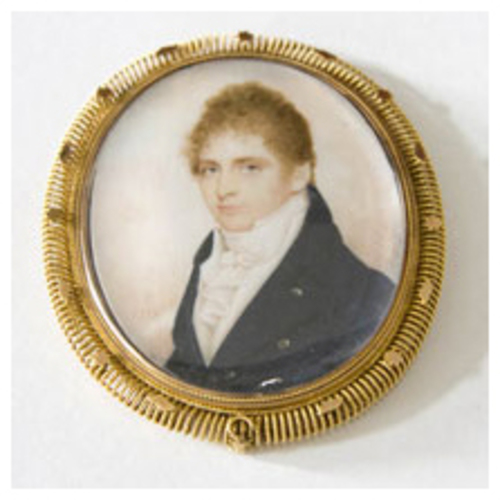UNIACKE, RICHARD JOHN, lawyer, politician, office holder, and judge; b. 6 June 1789 in Halifax, third son of Richard John Uniacke and Martha Maria Delesdernier; m. there 29 Dec. 1821 Mary Ann Hill, daughter of Charles Hill, and they had two sons and two daughters; d. there 21 Feb. 1834.
After graduating from King’s College, Windsor, Richard John Uniacke studied law and was admitted to the Nova Scotia bar on 25 July 1810. Hoping to improve his prospects, in 1813 he went to Cape Breton. That colony’s administrator, Major-General Hugh Swayne*, had fallen out with his attorney general, Richard Collier Bernard DesBarres Marshall Gibbons, and being acquainted with the Uniacke family he readily accepted the recommendation of Uniacke by the lieutenant governor of Nova Scotia, Sir John Coape Sherbrooke. Uniacke was appointed to the Executive Council on 6 December, made acting attorney general (confirmed in March 1814), and became Swayne’s private secretary. From January 1815 to September 1816 he was acting chief justice, but the reinstatement of Archibald Charles Dodd precluded his confirmation in this post. The fees and salary of the attorney generalship did not meet his expectations, and even his father’s influence could not obtain him another appointment. He therefore returned to Halifax to practise law, having resigned his council seat on 18 Oct. 1816 and the attorney generalship in September 1817. On 22 Oct. 1819 he succeeded his father as advocate general of the Vice-Admiralty Court in Halifax.
Three months earlier Uniacke had fought the last fatal duel on record in Nova Scotia with merchant William Bowie. The quarrel had begun during a court case in which Uniacke apparently imputed smuggling to Bowie. Much of the blame for the outcome has been attributed to Uniacke’s second, Edward McSweeny, who apparently insisted that the duellists fire a second time after neither had been hit during the first exchange. In the second round Bowie was mortally wounded. Uniacke and McSweeny were charged with murder but were acquitted.
Uniacke was elected to the House of Assembly as one of the two members for Cape Breton in 1820 after it was reunited to Nova Scotia. The other was Laurence Kavanagh, a Roman Catholic, and Uniacke was active in the successful attempt to allow Kavanagh to take his seat without making a declaration against transubstantiation as required in the state oath. Although a leader for Catholic emancipation, Uniacke was less accommodating towards the Presbyterians. While on a visit to Pictou Academy in 1826 [see Thomas McCulloch*] he apparently left the impression that he supported a permanent annual grant to the institution. However, in the 1828 session of the assembly he opposed a bill for that purpose, claiming that the academy’s charter had not been fulfilled and that such a grant would bring similar demands from other parts of the province. His stand drew the wrath of the Pictou Colonial Patriot, which described him as “interlarding his insipid harangues with . . . undeserved [insults].”
While a member of the assembly, Uniacke generally supported the Council in disputes over customs fees and bank bills. During the “Brandy Dispute” of 1830 [see Enos Collins*] he was one of three assemblymen to uphold the right of the Council to reject money bills. He did, however, side with the majority in the assembly in opposing a proposal for a bank in 1825, and in 1827 he supported the right of dissenters to be married by licence according to their own rites.
Made a kc on 17 March 1824, Uniacke became on 13 April 1830 the first native Nova Scotian to be appointed a puisne judge of the Supreme Court, after the more senior Samuel George William Archibald* had refused the post. In 1833 he tried two men and a woman for the murder of the woman’s husband and sentenced them to be hanged. He supposedly became very melancholy, perhaps remembering his own involvement with a charge of murder, and after a short illness he died the next year at the age of 44.
PAC, MG 11, [CO 217] Nova Scotia A, 152, 155, 172; MG 24, A5. PANS, MG 1, 926; MG 20, 65; RG 1, 62, 114, 173, 215, 289, 322. N.S., House of Assembly, Journal and proc., 1820–30. Acadian Recorder. Colonial Patriot (Pictou, N.S.). Novascotian, or Colonial Herald. B. [C. U.] Cuthbertson, The old attorney general: a biography of Richard John Uniacke (Halifax, [1980]). John Garner, “The enfranchisement of Roman Catholics in the Maritimes,” CHR, 34 (1953): 203–18.
Cite This Article
B. C. Cuthbertson, “UNIACKE, RICHARD JOHN (1789-1834),” in Dictionary of Canadian Biography, vol. 6, University of Toronto/Université Laval, 2003–, accessed December 20, 2024, https://www.biographi.ca/en/bio/uniacke_richard_john_1789_1834_6E.html.
The citation above shows the format for footnotes and endnotes according to the Chicago manual of style (16th edition). Information to be used in other citation formats:
| Permalink: | https://www.biographi.ca/en/bio/uniacke_richard_john_1789_1834_6E.html |
| Author of Article: | B. C. Cuthbertson |
| Title of Article: | UNIACKE, RICHARD JOHN (1789-1834) |
| Publication Name: | Dictionary of Canadian Biography, vol. 6 |
| Publisher: | University of Toronto/Université Laval |
| Year of publication: | 1987 |
| Year of revision: | 1987 |
| Access Date: | December 20, 2024 |



